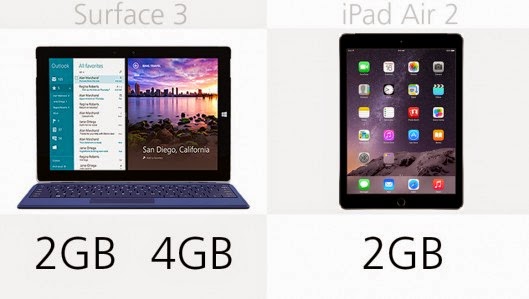Surface 3 vs. iPad Air 2
The Microsoft Surface lineup has always been better for work and versatility than at being dedicated tablets (you've never heard us recommend buying one without adding a keyboard cover). That isn't likely to change with the latest model, the Surface 3, but let's see how it stacks up next to the best dedicated tablet, the iPad Air 2.
Size
The Surface 3 is smaller than the Surface Pro 3, but it's still 10 percent taller and 11 percent longer than the iPad Air 2.
Thinness is a huge advantage for Apple (as it often is). The iPad Air 2 comes out at 30 percent thinner.
Weight
Even without the Surface's keyboard cover attached, the iPad Air 2 comes out at 30 percent lighter.
Build
Neither company made any changes with these latest models, as Microsoft sticks with magnesium and Apple is still going with aluminum.
Colors
You can spice up your Surface by adding some color to your keyboard cover or pen, but the main body only ships in silver. Apple lets you choose from silver, gold and space gray for the iPad.
Display (size)
The Surface 3 has a 19 percent bigger screen.
Display (resolution)
As a laptop, the Surface looks just about as sharp as you'd need it to. But as a tablet, when you bring it closer to your eyes, it will probably show its pixels a little bit – as 214 PPI isn't great for a tablet.
Though there are sharper tablet pixel densities than the iPad Air 2's 264 PPI, it's going to look much crisper in hand.
Pen input
You can buy third-party styluses that work with the iPad, but they're capacitive pens that simulate finger touches. The Surface 3 uses the same active capacitive pen that the Surface Pro 3 uses, providing a much more natural and integrated penning experience than you'll find on the iPad.
Desktop apps
Of course iOS is a mobile operating system, but the Surface 3 is the first non-"Pro" Surface that runs full Windows, including desktop apps.
Fingerprint sensor
Apple's excellent Touch ID made its way to the iPad in 2014, starting with this iPad Air 2 and Apple's throwaway Mini update, the iPad mini 3.
LTE model
The Surface 3 is the first full Windows-running Surface that you can buy in a cellular data-enabled variant.
Ports
The Surface's port selection would look a little skimpy compared to a pro-level laptop, but compared to the iPad, with its simple one-port focus, Microsoft's 2-in-1 has the more versatile selection.
Processor
A few years ago, a mobile processor outlifting any modern desktop processor would have been extremely unlikely. But the iPad's A8X chip is significantly faster than the power-sipping Intel Atom X7.
RAM
RAM is even in the entry-level Surface, but if you pay more for the 128 GB storage variant, it doubles the iPad's 2 GB.
Storage
Speaking of storage, the only difference here is that the iPad starts with a 16 GB model.
MicroSD
The Surface also lets you complement its internal storage by popping in a microSD card.
Battery
We still don't know a ton about the Surface's battery life (including its capacity), but Microsoft is estimating 10 hours of video watching. Apple's 10 hour estimate, meanwhile, is for web use over Wi-Fi.
Cameras
We don't use tablets for photography, but if you do, these are the camera resolutions you'll be dealing with.
Split-screen multitasking
Before iOS 8 launched, there were rumors Apple was working on a form of split-screen multitasking for the iPad, but that has yet to materialize. Windows lets you do that, in both Modern UI apps and on the desktop.
Software
The Surface 3 launches with Windows 8.1 (that's full Windows, but not the Windows 8.1 Pro that you'll find on the Surface Pro), and you'll be able to update it for free to Windows 10 after it launches.
The iPad runs iOS 8.
Release
May 5 is the first launch date for the Surface 3, with wider availability starting two days later. The latest iPad has been around since last October.
Starting price
If you bought the Surface just to use as a tablet, it would go toe-to-toe with the iPad's starting price – but we don't recommend doing that (Windows' selection of mobile-first apps is still underwhelming). Once you add the Surface's essential keyboard cover and optional Surface Pen, you're looking at a $680 starting price.
Just remember that the $500 Surface has 64 GB storage (plus that microSD slot), while a 64 GB iPad Air 2 will cost you $600.
courtesy by gizmag












.jpg)
.jpg)















No comments:
Post a Comment